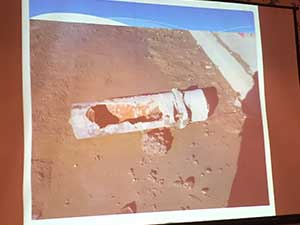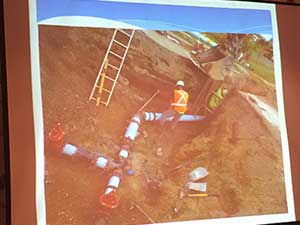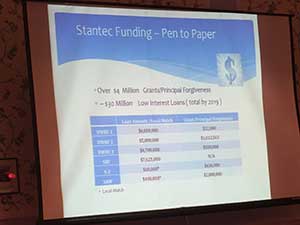 Old iron pipe |
 New PVC pipe |
Deteriorating water and sewer pipes are a tremendous problem in Flint and cities all across the state and country, including the little city of Burton. Frequent line breaks and service interruptions were leading to increased complaints from Burton residents. And the city hadn’t been able to meet their MDEQ certification in 2-3 years. But declining city revenues over the years had made it very difficult to provide residents with the reliable service they deserve.
In the city’s quest for answers, Burton Mayor Paula Zelenko learned of a more cost-effective solution at a U.S. Conference of Mayors event. She discovered that many communities were saving money by using PVC pipe rather than ductile iron. Unfortunately, the Genesee County Drain Commission specifications didn’t allow the use of PVC. Convinced that PVC was the best solution for their community, the city spent a considerable amount of time and effort to convince the county to approve PVC as an acceptable material.
 Although PVC would be a less expensive option than iron, it still presented challenges. The city enlisted the aid of Stantec Consulting to provide design services and search for funding sources. Stantec designed a system that would be implemented in five phases, at a cost of over $20 million. They also helped the city secure loans and grants from a variety of sources, which made the project possible. Key components to success were open procurement – searching for the best material at the best price – and principal forgiveness on a number of their loans.
Although PVC would be a less expensive option than iron, it still presented challenges. The city enlisted the aid of Stantec Consulting to provide design services and search for funding sources. Stantec designed a system that would be implemented in five phases, at a cost of over $20 million. They also helped the city secure loans and grants from a variety of sources, which made the project possible. Key components to success were open procurement – searching for the best material at the best price – and principal forgiveness on a number of their loans.
Educating the public was also essential. The pipes in the worst condition tended to be in the lower income areas of the city. Residents in other neighborhoods wanted to know why they had to pay to improve service in the most-affected sections of town. The city’s educational campaign emphasized that a good water system was critical to the economy of the entire community. A reliable water system would attract new businesses and people and therefore benefit everyone.
Burton has now completed phases 1 and 2 of the 5-phases water improvement project, which is on track for completion in 2019. The sanitary sewer improvements should be complete in 2017. The city’s water and sewer infrastructure is now much more reliable and has saved taxpayers tens of millions of dollars.
“Without the mayor’s vision, we wouldn’t be here talking about this today,” said Ray Marshke, Burton’s utilities superintendent. “You have to get out of your comfort zone, deal with these problems, and be better stewards of your infrastructure.”
For more information, download Burton’s presentation.

